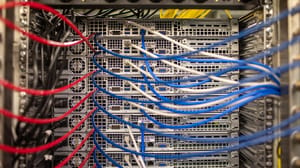Greenpeace, Facebook Announce Truce
After two years of sparring over data center energy, Greenpeace and Facebook today announced a truce, with Facebook agreeing to prioritize the use of renewable energy for its data centers, and Greenpeace suspending its "Unfriend Dirty Coal" campaign.
December 15, 2011

facebook-solarpanels
Facebook has built a large solar array next to its new data center in Prineville, Oregon.
After two years of energetic sparring, Greenpeace and Facebook today announced a truce, with Facebook agreeing to prioritize the use of renewable energy for its data centers, and Greenpeace suspending a social media campaign that targeted the social network. The two organizations also said they will collaborate on the promotion of green energy sources and encourage major utilities to develop renewable energy generation.
As part of the agreement, Facebook said it will seek to power its new data centers using clean and renewable energy. The company has already taken a major step in this direction in its latest data center project in Sweden, which will be powered primarily by renewable energy,
That's a shift from the social network’s first two company-built data centers in Oregon and North Carolina, which each relied upon utility power that originated primarily from coal. Facebook’s power sourcing had been highlighted by Greenpeace in a lengthy social media and PR campaign urging Facebook to “Unfriend Dirty Coal.” As a result of Facebook's announcement, the Greenpeace campaign will end today.
Preference for Renewables in Site Selection
"Facebook looks forward to a day when our primary energy sources are clean and renewable, and we are working with Greenpeace and others to help bring that day closer," said Marcy Scott Lynn of Facebook's sustainability program. "As an important step, our datacenter siting policy now states a preference for access to clean and renewable energy."
Facebook also said it will use the Open Compute Project to develop energy efficient solutions for the data center industry, and encourage other IT companies to power their operations with clean, renewable energy. Facebook also plans to engage in dialogue with utility providers about the sources of energy that power their data centres.
"Facebook's commitment to renewable energy raises the bar for other IT and cloud computing (8) companies such as Apple, IBM, Microsoft, and Twitter," said Casey Harrell, Senior IT Analyst for Greenpeace International. ''The Facebook campaign proved that people all over the world want their social networks powered by renewable energy, and not by coal. Greenpeace will continue to measure, report and campaign on the sector's progress to green the cloud."
Earlier this year Facebook installed a large array of solar panels at its new data center in Prineville, Oregon, which made it one of only a handful of data centers in the world to install on-site solar power generation. Greenpeace critiqued Facebook’s decision to build its new data center in Prineville, where the local utility uses coal to generate the majority of its power.
The environmental group mounted petition drives and protests using its own Facebook page, letters to Facebook CEO Mark Zuckerberg and even animated cartoons demanding that Facebook rethink its data center site location decisions. The dispute generated widespread news coverage and prompted 600,000 Facebook users to call on the company to “unfriend dirty coal.”
Here's a look back at the history of the feud and some of the key skirmishes:
About the Author
You May Also Like



.jpg?width=300&auto=webp&quality=80&disable=upscale)



